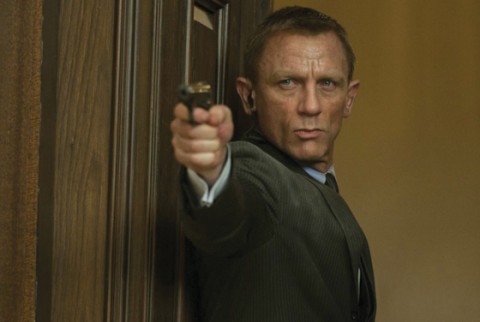Low-tech Bond

Viewers don’t look to James Bond movies for profundity. Mostly they go to see buxom babes (now brainier and badder) and gravity-defying vehicle chases. But the most recent Bond installment offers some pertinent comments on technology (and I don’t say that just because Daniel Craig, who plays Bond, is stepbrother to the theologian Phillip Blond). Besides raising the question of whether technology or know-how is more important, Skyfall wrestles with the heritage of the past and the pain of getting older.
Skyfall opens with a not uncommon Bond trope: the apparent death of 007. The head of MI6, M, played by the exquisite Judi Dench (some smart periodical called her the real new “Bond girl”), has to order an agent to take a not altogether clean shot at a baddie whom Bond is fighting on a moving train. She ends up shooting Bond, who cascades hundreds of feet into a Turkish river. He’s presumed dead, and the baddie escapes with identities of undercover British agents. Eventually views of the executions of these agents start appearing on the Internet. In the fearful new world of social media, inside information is different from what it was when spies looked for missile launch codes. Now the heavies post execution videos for their bad-guy friends to “like.”
Read our latest issue or browse back issues.
Of course, Bond turns up again. But he’s not himself, having taken a bullet from a high-powered rifle and spent a little too long under water. He can’t pass the psychological or physical tests to return to service. For the first time, the eternally youthful Bond looks like he’s washed up, past his prime. M puts him back in the field anyway to trace the lost identity info. First he’s equipped by Q, played with droll humor by Ben Whishaw. “What’s this?” Bond asks. “A radio,” Q says in deadpan. “What did you want, an exploding pen? We don’t really go in for that sort of thing anymore.” But such dated technology comes in handy later.
Craig plays Bond with barely contained pent-up energy. He personally reignited the series in Casino Royale with his growling riff on a Bond stock phrase. When a bartender asks him how he wants his vodka martini, instead of the purring the patented “Shaken, not stirred,” Craig spits out, “Do I look like I give a damn?” That was the first Bond movie in which a Bond kill looked as violent as murder is. Quantum of Solace, the next entry, was a drag. Written and filmed in a hurry because of a Hollywood labor struggle, it was neither funny nor cool.
Skyfall returns both the wit and the foot-off-the-ground cool. The filmmakers clearly intended to restore the best of the old Bond style, with a classic introductory song and montage, while humanizing Craig and giving him room to be witty.
The Bond series is undeniably problematic. In making the women cooler and letting them play at the spycraft, the filmmakers don’t make them any more than the usual eye candy. And the cartoonish violence makes violence seem less heinous than it is in the real world. But one doesn’t go to Bond expecting enlightenment on such fronts. Bond movies are supposed to be fun and cool. And this one is.
In a new motif for Bond, the action finds its way to his childhood home, a Scottish mansion called Skyfall. It looks grimly medieval, and it is so far out of the way that cell phones don’t work. Bond escorts M there in a vintage Aston Martin of the sort Bond has driven for decades, replete with machine guns under the hood—the best of the Bond technology of the 1960s. The Skyfall manor features the best of 16th-century technology—a priest’s door, designed to help Roman Catholic priests avoid Queen Elizabeth’s Protestant henchmen. The baddies are felled by booby traps. The bad guy gets taken down not by some advanced gizmo but by a dagger in the back. Instead of James Bond’s typical trope of outdoing the bad guys with superior technology, here Bond and M outdo them with elbow grease and cleverness.
Skyfall makes us oddly nostalgic for technology-free fighting. But to indulge that nostalgia is a mistake; the old ways have their own technology. Somebody fashioned that dagger, and medieval manors were a great architectural achievement. The underground tunnel behind the priest’s door required some impressive 16th-century digging chops. Human beings don’t predate technology—it seems to be part of who we are. We are tool-making animals, as the sociologists say. So while I am tempted to issue jeremiads about how current technology is making us dumber, there are no humans who don’t use technology in some way. The question—in our churches as elsewhere—isn’t whether to use it, but how to use it.





